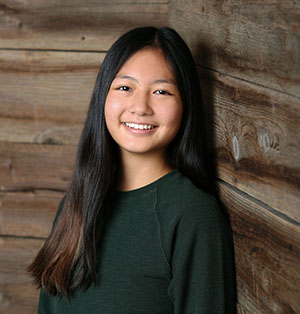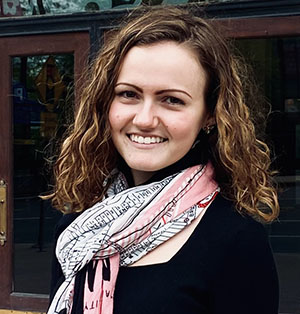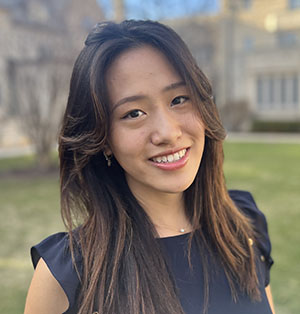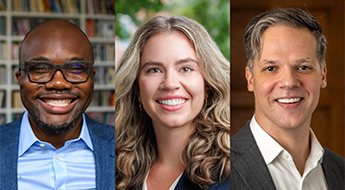SURA 2024 Student Blog
Get all our news
Each summer since 1998, the Institute for Policy Research (IPR) has run the Summer Undergraduate Research Assistants (SURA) program, which gives undergraduate students first-hand experience in the conceptualization and conduct of policy-relevant social science research. This year, SURA students are sharing their research experience from their own perspective, and we will feature students discussing the research projects they are part of throughout the summer.
Cassie Lee: Understanding the Impact of Dam-Induced Displacement

Cassie Lee is working with IPR anthropologist Thomas McDade to understand how the environmental and social impacts of dam-induced displacement are embodied in maternal and child health.
Although the construction of hydroelectric dams has been criticized for its impact on health and the environment, large infrastructure development projects are still considered integral to economic development in low- and middle-income countries. For example, upon its completion, the Thwake Multipurpose Dam in Makueni Kenya is expected to alleviate experiences of water insecurity and enhance economic development through an increased water supply for irrigation and electricity generation.
The displacement and disruption associated with such infrastructure projects may translate into long-term health impacts not captured by environmental and social impact assessments. Nonetheless, the biosocial implications of these projects, especially among vulnerable populations such as women and children, are not well understood.
This summer, I am working with biological anthropologists Dr. Thomas McDade, Dr. Patrick Owuor, and Dr. Aaron Miller to understand how the environmental and social impacts of dam-induced displacement are embodied in maternal and child health. More specifically, my work focuses on analyzing markers of environmental stressors through chronic stress and systemic inflammation in mothers and their children.
I have learned how to quantify the concentration of cortisol in saliva (a measure of stress) and the concentration of C-reactive protein (biomarker of inflammation) in fingerstick blood samples in the lab, explored how to integrate biological measures with ethnographic techniques in the field, and familiarized myself with regulatory frameworks such as environmental and social impact assessments.
Understanding the biological health consequences of large infrastructure projects at the individual level will help integrate biosocial impacts with environmental and social impact assessments. This project will provide policy-relevant insights for creating sustainable mitigation measures to reduce the impacts of environmental stressors such as those caused by infrastructure projects.
My summer undergraduate research experience with IPR has been extremely rewarding and encouraged me to look for more ways to link population health research with potential policy outcomes.
Cassie Lee is a rising senior from California studying environmental science, global health, and data science. They are passionate about the ways climate change and related environmental exposures impact health and development. In their free time, they enjoy hiking, reading, and various fiber arts.
Mollie Guba: Studying Universities' Commitments to Students' Free Speech

Mollie Guba is working with IPR associates Max Schanzenbach and Kimberly Yuracko to examine the protections and limitations that private universities impose on speech.
This summer, I am assisting Dr. Max Schanzenbach and Dr. Kimberly Yuracko on their research examining the regulation of student speech on university campuses. The project focuses on the various ambiguities in colleges’ commitments to free expression and the need for private universities to adopt a more consistent approach to speech regulation. Because public universities are bound by the First Amendment, these institutions can only limit the time, place, and manner of students’ speech, but as I have learned this summer, the situation at private universities is far more complex.
My role has primarily involved researching the protections and limitations that private universities impose on speech through policies and institutional commitments. I have seen that, without the constraints of the First Amendment, many private colleges do not voluntarily commit to a viewpoint-neutral approach to speech in line with public universities’ obligations. Additionally, private colleges often have other policies in place that can potentially undermine their stated commitment to free speech, creating uncertainty in how these schools will handle controversial or hateful speech. By examining private universities’ student handbooks, conduct policies, and disciplinary processes, I have been able to gain a more nuanced picture of how individual institutions define their scope of permissible expression.
While the proper extent of protected speech on campuses has always been heavily debated, the complexity of this issue has reached unprecedented levels in the past year, which has made my research experience this summer especially fascinating. I have been able to explore an issue that is of great interest to me as an aspiring lawyer with an interest in constitutional law and that is highly relevant to me as a student during this uniquely challenging time on college campuses. Further, by learning from Dr. Schanzenbach and Dr. Yuracko’s work, I have gained valuable insights into the process and substance of legal scholarship, which I hope to apply in my own senior research project this year. I am grateful to Dr. Schanzenbach and Dr. Yuracko and to IPR for this rewarding opportunity, and I look forward to building on what I’ve learned this summer in my future research experiences.
Mollie Guba is a rising senior from Chicago majoring in Philosophy and Legal Studies. After graduation, she hopes to attend law school and pursue a career in criminal or constitutional law. Through the SURA program, Mollie has sought to further explore her interests in law as well as her research interests at the intersection of law, public policy, and ethics. Outside of classes, Mollie enjoys playing her cello, reading, and spending time in Chicago with family and friends.
Jasmine Sun: Investigating the Role Chicago's Universal Pre-K Rollout in Closing the Achievement Gap
 Jasmine Sun is working with IPR developmental psychologist Terri Sabol and economist Diane Whitmore Schanzenbach to understand the impact of Chicago’s Universal Pre-K program on a myriad of stakeholders including children, families, and caregivers.
Jasmine Sun is working with IPR developmental psychologist Terri Sabol and economist Diane Whitmore Schanzenbach to understand the impact of Chicago’s Universal Pre-K program on a myriad of stakeholders including children, families, and caregivers.
To close the achievement gap and support the overall success of children, the city of Chicago began rolling out universal pre-K in 2018, prioritizing economically disadvantaged communities. Free, full-day pre-kindergarten for all 4-year-olds has since expanded citywide.
This summer, I have had the immense privilege of working with Dr. Terri Sabol, Dr. Diane Schanzenbach, and the Early Childhood Research Alliance of Chicago (EC*REACH) to understand the impact of Chicago’s Universal Pre-K program on a myriad of stakeholders including children, families, and caregivers.
As inequity related achievement gaps tend to start from an early age and grow over time, affecting long-term academic and social outcomes, research on how high-quality early childhood education can be implemented effectively is critical. Given the prominent role that access to early childhood education and care has played in political discussions, Chicago’s universal pre-K rollout can serve as a model for policy decisions to support and enhance early education programs nationwide—an important step in a broader agenda to ensuring equitable access and opportunities for all children.
As part of the effort to understand Chicago’s universal pre-K rollout, I’ve had the opportunity to develop both my qualitative and quantitative research skills. On the qualitative research team, I’ve coded transcripts of interviews with teachers to identify recurring themes aligning with key research questions. On the quantitative side, I’ve applied and expanded my knowledge of Stata to contribute to an accessible and accurate integrated data system for future Chicago early childhood research.
The mission of EC*REACH, to drive meaningful change by leveraging data and expertise across a diverse collaboration of partners, is a project I find motivating and inspiring. Working as a tutor for the last two years with Books & Breakfast, a nonprofit that aims to address resource gaps by providing academic support and nourishment to elementary schoolers in Evanston, has underscored how investing time, resources, and care into students is crucial for them to thrive. The personal connections that I’ve built with students have not only sparked an interest in understanding how we can build systems and policies that invest in people and empower them to achieve their fullest potential on a broader scale, but reaffirmed my belief that access to quality education from an early age is a key cornerstone in this goal. My experience this summer has deepened my understanding of how data-driven insights support evidence-based policy for meaningful progress on a systemic level. I am extremely grateful to have been able to learn from experienced mentors, apply my academic knowledge, and witness the rigorous work that is invested into research.
Jasmine is a rising junior from Long Grove, IL majoring in Economics and Data Science with a minor in Mathematics. Building off her work at the IPR this summer, in the future she hopes to continue to develop her skillset to contribute to better-informed education policy. In her free time, you can find her running along the lakefill, exploring a new café with a book in hand, at the Evanston farmers market on summer Saturday mornings, and spending time with friends. On campus, she is involved with Books & Breakfast and Student Consulting for Non-profit Organizations.
Published: July 29, 2024.


